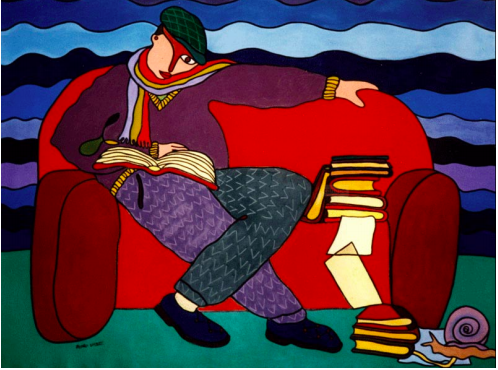The Red Poppy Art House, named so after lines from Pablo Neruda’s poetry, was graced by an old friend and the spearhead of the first English-language feature-length documentary about Pablo Neruda.
“There is a natural impulse, a natural vocation, a natural calling that a poet feels,” relayed Mark Eisner, editor of The Essential Neruda: Selected Poems, a man dedicated to uncovering and sharing Neruda’s life and influence, and a member of the Red Poppy family since its infancy. Eisner, also the producer of the documentary-in-progress The Poet’s Calling, struggled over the title of this forthcoming movie, wanting to title the full-length film with the same title as the short film he produced in 2004, Pablo Neruda! Presente!
“Presente,” translated from Spanish to “present” in English, was the chant that rung in the air by the thousands of people who attended Neruda’s procession on the day of his funeral. To Eisner and to many around the globe, present is what Neruda will always be.
Canapé by Pedro Uhart
Feeling concerned about the title of the documentary, Eisner sent out a survey to trusted colleagues and friends, ultimately resting on “The Poet’s Calling,” a variation of the Pablo Neruda poem, “Deber del poeta,” or “The Poet’s Obligation,” as translated by Alastair Reid in The Essential Neruda. In the poem, Neruda describes how he must always be present for the waves, their sounds, their feeling and that which calls and lives among them; he must always listen to their emotion and continually allow it to pour into him, the vessel that he is, so that he may release the ocean’s songs through his words for those who are kept from hearing the sounds of the ocean themselves.
Eisner explained that a great beauty of Neruda’s poetry is that, like the author, it was constantly evolving, and the public bore witness to that evolution because he was always being published since a very young age. Pablo Neruda was born to a lower middle class family in Chile and suffered the loss of his birth mother and the throws of a father who did not want his sons to pursue artistic occupations. Eisner believes that Neruda fell in and out of what we now identify as serious mental illnesses such as depression and bipolar disorder.
“He was himself in so many situations,” commented Eisner.
For Eisner, pursing the making of The Poet’s Calling was inspired by the realization that Pablo Neruda’s life — the personal, the poetic and the political – needed to be seen visually.
PRESENCE, the Red Poppy Development Cohort, and attendees of the July 10th Pablo Neruda Centennial 10th Anniversary Celebration — which featured live music by Quijeremá and readings of poetry by Adrian Arias, Jennifer Barone, William O’Daly, Ingrid Keir, Barbara Paschke, and Michael Warr — were treated to a reel of material from The Poet’s Calling. In the film preview, different representative voices, such as Chilean market workers, professional artists and even those who built and frequented the homes of Neruda, share their opinions about the man and the feeling his poetry will forever evoke in their souls. Jack Hirschman and Lawrence Ferlinghetti discuss the effect of Neruda’s work, saying that “he was a guy who was always involved in experiment” and that his involvement with poetry brought him close to the people.
Since its first incarnation, The Poet’s Calling has been a film 11 years in the making. Recently, filmmaker Rachael Seifert has been inspired to join the project, and it is soaring with a release date planned for the spring of 2015.
“The vividness and ripeness of [Neruda’s] words” energize Eisner, who carried with him a Neruda book while traveling and living in South America. Eisner shadowed agricultural field workers in Central America and also worked on a farm next to a vineyard in Chile, witnessing the reason of Neruda’s “Ode to Wine.”
There was a moment in Eisner’s life when he was reading Neruda in Spanish and could feel the sentiment and the core of the language. He understood that the translations he was reading often were not keeping the truth of Neruda’s words. So, he decided that he would work on a collection of translations, one that combined the work of seven translators, to better serve Neruda’s readers and Neruda’s legacy. Although The Essential Neruda is one of Eisner’s greatest accomplishments, he admits that “a translation is never finished. It’s infinite.”
Learn more about The Poet’s Calling and view a sample clip of the film here.
– Aleksandra Bril, Red Poppy Art House Writer
